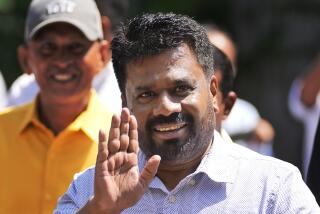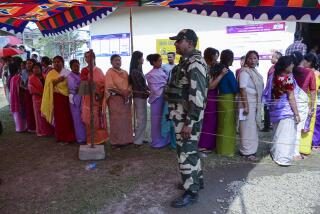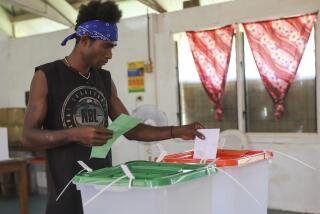Sri Lankans Go to Polls in East Despite Tamil Boycott
- Share via
NEW DELHI — Boycotted by die-hard Tamil separatists as an army-scripted charade, municipal elections were held by Sri Lanka’s government in the embattled east Tuesday for the first time in a decade.
The government aim was to prove that peace has been restored. More than 750,000 voters were eligible to elect 40 local councils in the districts of Trincomalee, Batticaloa and Amparai on the island nation’s eastern coast, along with the northern town of Vavuniya that was won back from the rebels three years ago.
Reports said more than 5,000 armed personnel were deployed to guard polling booths, but some observers saw their presence as a threat, not a safeguard.
“There is no way that this election can be fair because the security forces are intervening in a very direct way,” one prominent human rights activist, a member of the ethnic Sinhalese majority, said by telephone from Colombo, the capital.
“They have distributed leaflets at security checkpoints, and even at the stage of nomination there was police pressure on the people to enter the elections on behalf of various parties,” said the observer, who asked not to be identified by name for fear of reprisals.
Most candidates were ethnic Sinhalese supporters of the government. The few Tamils running for election were members of former rebel factions now working with the country’s army.
As election day approached, there had been accusations that security forces distributed pamphlets in favor of the ruling United National Party and rounded up Tamils to pressure them to vote.
Another menace was posed by the Tamil Tiger militants who have been battling for a separate state for the ethnic minority that makes up 18% of Sri Lanka’s 17 million people. The rebels, who still hold much of the country’s north, called on Tamils to stay away from the polls, and some feared that they would seek revenge on voters.
Tamils not voting ran the risk of being branded terrorist sympathizers by the army, so Tamil groups fielding candidates endorsed a strategy of spoiling the ballot papers to deny the Sinhalese-dominated UNP a victory.
The elections for town and village councils, the first since the Tamil Tigers launched their independence struggle more than a decade ago, are being used to prove that the regime of President Dingiri Wijetunge has retaken sufficient control to restore elected local government in some areas.
More than 19,000 people are believed to have died in the fighting that has bloodied the lush island off India’s tip. Last year, Wijetunge’s predecessor, Ranasinghe Premadasa, was assassinated by a suspected suicide bomber. But gradually, the Sri Lankan army has retaken major coastal towns and roads in the east and pushed the guerrillas into the jungles.
Poll results were not expected before today, but government officials happily claimed Tuesday night that more than 60% of the electorate had ignored the boycott call and cast ballots. Now security forces can leave the pacified areas, they said.
More to Read
Sign up for Essential California
The most important California stories and recommendations in your inbox every morning.
You may occasionally receive promotional content from the Los Angeles Times.













